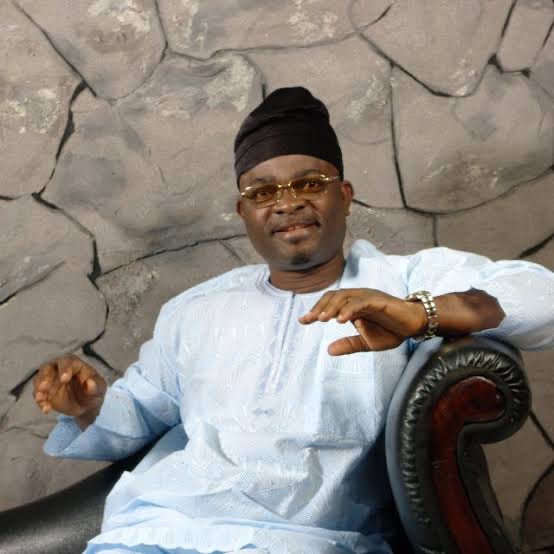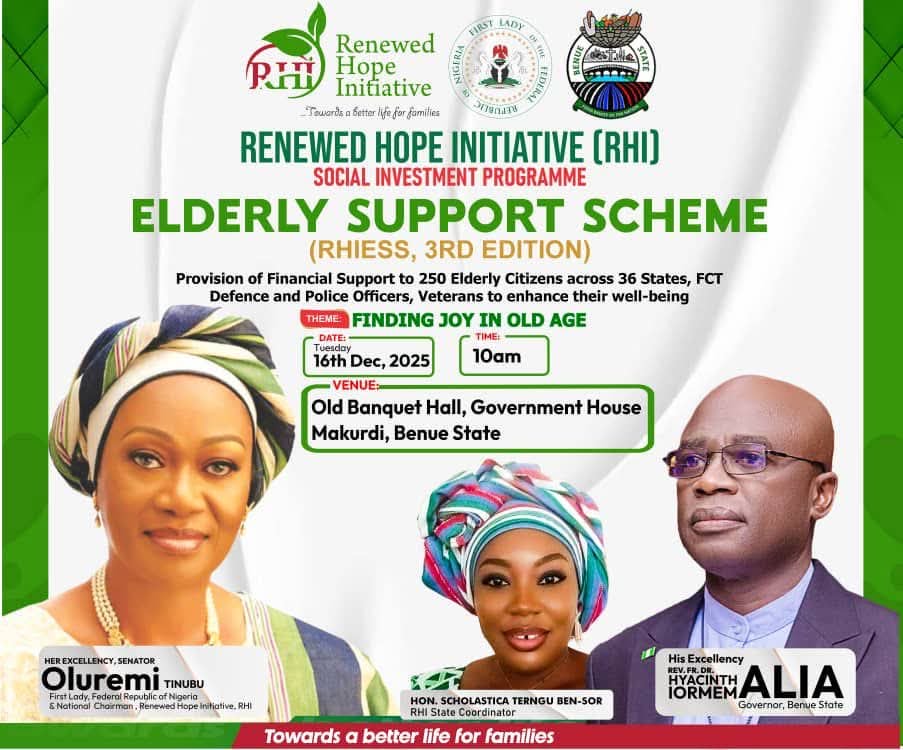NEWS
Kukah Centre Engages Religious Leaders as Nutrition Advocates

The Kukah Centre (TKC), a policy research institute, has coopted religious leaders as nutrition advocates to help Nigerians navigate the economic challenges and fight malnutrition.
Fr Atta Barkindo, the Executive Director of TKC, made this known at a One-Day Strategic Dialogue on Nutrition by National Faith Influencers with the theme` `Faith Influencers Leading the Way: Transforming Nutrition for a Healthier Nigeria’’.
The dialogue was organised by The Kukah Centre, in partnership with the Sultan Foundation with support from the World Bank through the Accelerating Nutrition Results in Nigeria (ANRiN), on Thursday in Abuja.
The dialogue aims at tackling Nigeria’s persistent malnutrition challenges by bringing together religious leaders to champion the cause of proper nutrition through supporting the initiative of ANRiN in addressing the critical issue of malnutrition.
According to Barkindo, by engaging religious leaders to harness their influence to promote a culture of nutrition and health, Nigeria will become a more prosperous nation.
“Religious leaders have a significant influence on their congregations, making them ideal advocates for promoting positive change.
“There is need for change in value system, so we want to educate Nigerians on the proper way to channel their resources wisely and feed correctly.
“Sometimes, the issue is not lack of resources but improper management of finances and the value system of people, the choice of food matters a lot .”
Ms Anna Swanta, the Project Officer of TKC, said that the ANRIN initiative commenced in 2018 to tackle the challenge of malnutrition by expanding access to quality, cost- effective nutrition services for pregnant and lactating women, adolescent girls, and children under five.
Swanta said that the ANRIN project aimed to scale up nutrition interventions while strengthening the capacity of both federal and state governments to plan, finance, and implement these programs effectively.
“This is facilitated through Disbursement Linked Indicators (DLIs) that incentivises the provision of nutrition-sensitive antenatal care.
“This strategic dialogue sought to leverage the influence of faith leaders to promote better nutritional practices and advocate for policy improvements aimed at addressing Nigeria’s alarming malnutrition rates.
“Child malnutrition is a critical issue in Nigeria, with 37 per cent of children under five experiencing stunted growth due to poor nutrition and inadequate breastfeeding.
“The problem becomes even more alarming as children grow older, with stunting rates rising to 47 per cent among those aged 24-35 months.”
Swanta said that this therefore, underscored the urgent need for targeted nutrition interventions to protect the health and future of Nigerian children.
“The choice of faith leaders stems from the fact that they hold a unique position of influence and trust, making them pivotal in driving change within their communities.
“This initiative provides a platform for them to advocate for better maternal and child nutrition, raise awareness about the importance of healthy feeding practices, and support broader efforts to reduce malnutrition rates.”
Swanta said that by leveraging the influence of religious leaders, the initiative aimed to achieve better health outcomes for Nigerian women and children and the achievement of sustainable improvements in Nigeria’s nutrition landscape.
Ms Asabe Ndahi, Project Manager ,TKC ,said that some of the dialogue emphasised the relevance of leadership from the perspective of fatherhood and religion.
Ndahi added that it also has to do with the role of experienced mothers in cascading wisdom and knowledge to younger generations, value re-orientation, and accountability.
She said that the initiative encouraged the participants to become advocates for nutrition and better health practices in pregnancy, breastfeeding, and child development.
“The conversations led by faith influencers and nutrition experts were centred on pregnancy health, myths, breastfeeding, hygiene, and complementary feeding including statistical analysis and intervention pathways.
“The faith influencers will launch new advocacy campaigns at both state and local government levels to raise awareness and push for concrete action on malnutrition.”
Ndahi said that TKC would provide continued support to participants to ensure that the strategies developed during the dialogue are implemented effectively.
Additionally, she said the dialogue’s outcomes would be shared with government agencies and development partners to encourage broader collaboration.(NAN)
NEWS
The Man Rotimi Makinde: A True Progressive by All Standards

By Kolapo Ogundare
It is impressive to note that many well-meaning Nigerians are now coming out, recounting several good deeds and socio-economic empowerment programmes which Hon. Rotimi Makinde embarked on when he held sway as the representative of Ife Federal Constituency at the House of Representatives in Abuja.
There are several accounts of how the veteran actor and politician touched many lives through scholarships to brilliant but indigent students, and financial support to small and medium scale business owners.
Provision of barbering kits to barbers, and hairdressing equipment to hair dressers in large numbers; provision of buses, tricycles, motorcycles and cars to several vulnerable segments of the society etc.Notable among his midas touch even as a Muslim was the building of a church to replace the old church of popular pastor, Akinola, who was assassinated on the eve of 2011 elections, which Makinde eventually won.
Records show that the church was built in the late pastor’s memory to compensate the church leaders, the surviving widow of the church founder and other innocent people who lost their lives to the cold hands of death by men of the underworld.
In addition to this church building was a two-bedroom flat for the widow, prophetess Akinola.
The church cost over N10 million (as it then) was officially inaugurated on October 27, 2014. Makinde’s act of giving back to his community is a testament to his commitment to serving and uplifting his constituents.
Reminiscing on this significant milestone, Prophet Elijah Makufota said:
“Only a liberal Muslim by faith can build a church. Today we celebrate a remarkable philanthropist Hon Rotimi Makinde whose generosity knows no borders—bridging mosques and chapels, uniting hearts across faiths. His vision reminds us that love, compassion, and service are the truest expressions of any religion. A rise La ri ka “.
Fairness, kindness, and justice are the true compasses of a good heart—not the label of a creed. When we measure a person by the content of their character rather than the doctrine they profess, we strip away the divisions that religion often erects and focus on the common thread that binds us: our shared humanity.
In a world where every individual is judged by how they treat others, by the equity they extend in everyday interactions, and by the integrity they show when no one is watching, we create a society that thrives on cooperation rather than conflict. Let us therefore place our emphasis on the principles that unite us—fairness, compassion, and justice—and allow those values, not religious affiliation, to be the true yardstick of a person’s worth.
“A kind act is a universal prayer; a fair decision, a lasting testament. Let us be judged by the deeds we do, not the faith we claim. Rotimi Makinde remains a shining light in our body politic and surely posterity will be kind to him.
A leader with quality and distinction is characterized by their ability to inspire, guide, and support a team. They are self-aware, communicate effectively, delegate work, and encourage strategic thinking. These qualities are essential for leading with confidence and fostering a productive, motivated team. That is who Rotimi Makinde is, this true blood of Ile-Ife undoubtedly has a date with destiny and will surely be marked out for positive trajectory in our political landscape.
All our political stakeholders and decision makers must take note of this political icon, a loyal party man, he is ever patriotic and with great uncompromising spirit, he is one individual who on several occasions sacrificed his convenience in the best interest of his party All Progressives Congress (APC) and Osun State particularly.
Makinde has consistently demonstrated resilience, a strong work ethic and an unwavering commitment to excellence in the execution of any assignment given to him with high moral rectitude. I wish him best of luck in his political journey. May God bless Osun State, bless our leader and mentor, President Bola Ahmed Tinubu GCFR and also bless our dear country, Nigeria.
Kolapo Ogundare writes from Ede, Osun State.
ReplyForward
Add reaction
NEWS
FG, NBS Launch Nationwide MICS7 Survey
From Francis Sadhere, Delta
The Federal Government of Nigeria, through the National Bureau of Statistics (NBS), has officially launched the Multiple Indicator Cluster Survey Round Seven (MICS7), a nationwide household survey supported by the United Nations Children’s Fund (UNICEF).
MICS7 is the seventh round of the globally recognised Multiple Indicator Cluster Survey programme and is aimed at generating critical data on the well-being, health, education and living conditions of women and children across Nigeria.
The survey is expected to provide reliable statistics to support evidence-based policymaking and enable effective tracking of Nigeria’s progress toward achieving the Sustainable Development Goals (SDGs).
The survey covers key thematic areas such as education, health, nutrition, immunisation, water, sanitation and hygiene (WASH), and child protection. It also introduces new data collection modalities to capture emerging development indicators.
Trained enumerators are currently visiting selected households across the country, using digital data collection tools to ensure accuracy, efficiency and real-time validation of responses.
One of the major innovations of MICS7 is the introduction of anthropometric measurements for children under the age of five, which will provide more precise data on child growth, nutritional status and overall health.
The survey also features a new learning foundation component designed to capture school-related data, alongside expanded indicators that were not included in previous survey rounds.
Speaking on the exercise, the National Coordinator of MICS7 at the NBS, Dr. Isiaka Olarewaju, said the survey would track up to 40 internationally comparable indicators, making it one of the most comprehensive household data collection exercises in Nigeria.
He stressed that the success of the survey largely depends on the cooperation of selected households and urged Nigerians to welcome enumerators and provide accurate information.
MICS7 is being implemented through a collaborative partnership involving the NBS, UNICEF and state governments across the federation. The partnership, according to stakeholders, reflects a shared commitment to advancing national development through the generation of reliable and actionable data, particularly for children, women and households.
In Delta State, the Director of Statistics, Nkechi Maduemezia, has appealed to residents of selected households to fully cooperate with interviewers to ensure the success of the survey in the state.
She noted that accurate participation would contribute to improved planning, better service delivery and stronger development outcomes for both the state and the country.
The nationwide data collection exercise is expected to last about six months, after which the findings will be analysed and disseminated to inform national and state development policies, human capital development strategies and child-focused interventions.
NEWS
Finding Joy in Old Age: The Renewed Hope Intervention

By Bridget Tikyaa
Getting to the life journey of a senior citizen should ordinarily be a source of pride, a stage of celebration in life, less hassles, basic comfort, and time to savour the fruits of one’s labour. However, the reality is that things don’t turn out to be this way in most climes.
Just like in other parts of the world, in Nigeria, the elderly population are facing numerous challenges ranging from difficulties in accessing affordable, specialized healthcare services to address age-related health issues, irregular pensions and financial support to ensure decent living, improper access to basic amenities like housing, sanitation, and nutrition, emotional support, and many others.These are essentials that can significantly improve the quality of life for elderly individuals. The difficulties in accessing them highlight the need for improved social support systems, healthcare infrastructure, and policies to protect the rights and dignity of elderly individuals in Nigeria.
However, amidst these challenges, an organisation committed to better welfare for Nigerians has significantly focused on rendering vital support to vulnerable elderly Nigerians, giving them hope, comfort, and a new lease of life. This is the Renewed Hope Initiative (RHI), through its Elderly Support Scheme.
The Renewed Hope Initiative is the flagship programme of Nigeria’s First Lady Oluremi Tinubu, focusing on women, youth, children, and the elderly. The RHI is where every Nigerian’s dream of a better life is reached and has been creating real, lasting change by focusing on families, dignity, and opportunities.
Since 2023, the Renewed Hope Initiative has consistently celebrated elderly citizens every December as a mark of appreciation for their sacrifices. On Tuesday, December 16, 2025, the RHI held the third edition of such intervention – the Elderly Support Scheme – in Benue State at the Old Banquet Hall, Government House, Makurdi, with the theme “Finding Joy in Old Age”.
It is not just an RHI agenda but part of the Nigerian government broader social investment efforts aimed at promoting the dignity, comfort, and well-being of elderly Nigerians.
During the third edition of the Elderly Support Scheme, 250 vulnerable elderly citizens aged 65 years and above were supported by the RHI in Benue State. Significantly, the same number of elderly citizens in all the states of the Federation and the Federal Capital Territory received similar support.
Each beneficiary received N200,000 during the ceremony in Makurdi, while Governor Hyacinth Iormem Alia gave each beneficiary a bag of rice. There was also a free medical outreach for the elderly, during which beneficiaries received basic health checks, consultations and medical support, underscoring the holistic approach of the initiative to both financial and health needs of senior citizens.
Benue State Coordinator of the Renewed Hope Initiative, Hon. Scholastica Ben-Sor said the initiative, a pet project of Nigeria’s First Lady Remi Tinubu, reflects a resolute determination to honour senior citizens who have contributed immensely to nation-building.
She noted that since 2023, the Renewed Hope Initiative has consistently celebrated elderly citizens every December as a mark of appreciation for their sacrifices, with a total of 9,500 beneficiaries nationwide each receiving ₦200,000, totalling N1.9 billion.
“As we approach the festive season, it is our moral duty and indeed our joy to ensure that our elderly live their twilight years in comfort, good health and dignity,” the First Lady said in the message to the event.
The purpose is to make the senior citizens remain active, find purpose in community life, and embrace joy in old age.
For Hon. Scholastica Ben-Sor, valuing elderly citizens is absolutely necessary. “What you are today is not forever. Life may take you through certain curves you don’t know. The least person you see today may be the person you will look up to tomorrow,” she said, calling on society to treat the elderly with dignity, respect, and compassion.
She hailed all those impacting lives including Governor Hyacinth Iormem Alia, whom she described as a man of integrity, sacrifice and uncommon commitment to service, who has positively impacted families, homes and society at large, stressing that family, church and school form the bedrock of any society.
Although the governor did not attend the event, Hon. Ben-Sor disclosed that he directed that each of the 250 beneficiaries receive a bag of rice through the State Emergency Management Agency (SEMA), in addition to facilitating the free medical outreach conducted for the elderly during the programme.
Goodwill messages were delivered by several dignitaries, including a representative of the wife of the Deputy Governor of Benue State, Hon. Mrs. Christy Ode, who praised the First Lady for sustaining the initiative and applauded Governor Alia for his visible developmental strides across the state while the Commissioner for Women Affairs and Social Development, Mrs Teresa Odachi Ikwe, represented by the Director of Finance and Accounts, Hon. Ifa Celestine commended the transparency of the RHI and advised beneficiaries to use the funds judiciously to improve their standard of living. Similarly, the Benue State Women Leader of the All Progressives Congress, Hon. Mrs. Helen Agaigbe appreciated the First Lady for her remarkable traits of compassion displayed through consistent support for the vulnerable in the society.


















